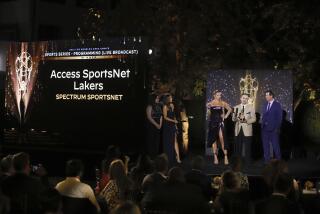Fever for Sports Bests Fervor for Religion on Rogers Cable
- Share via
Despite warnings by televangelists about the threat posed by “secular humanism,” the real challenge to religion in America today may come from sports.
Some people feel as strongly and passionately about sports--especially when it comes to hometown teams or national championships--as they do about their faith.
This conflict is often put into sharp focus at Super Bowl time. In Texas last January, several ministers, worried that parishioners would choose the Super Bowl over Sunday services, set up big screens in church auditoriums and scheduled services around the game.
In late March, Mike Schenker, executive vice president of Rogers Cable in Orange County, had a similar choice: showcasing the Angels or praising the Lord. When the Z-Channel--featuring games from Anaheim and Dodger stadiums--suddenly became available, Schenker decided the best available spot for the programming was occupied by Tustin-based Trinity Broadcasting Network, a 24-hour-a-day Christian service, and its flagship station, KTBN-TV, Channel 40.
The local division of Rogers, the third-largest cable company in the nation, serves 73,000 subscribers in Garden Grove, Huntington Beach, Fountain Valley, Westminster, Stanton, Los Alamitos and Cypress, Schenker said.
An earlier viewer sampling indicated that TBN, whose centerpiece is the “Praise the Lord” talk show hosted by Paul and Jan Crouch, was not highly rated among Rogers subscribers. Also featured on the service is the Rev. Robert Schuller’s “Hour of Power” broadcast from the Crystal Cathedral in Garden Grove.
Word of the Z-Channel’s availability spread so quickly that, without any
announcement or advertising, more than 250 people called to voice interest in signing up for the Z-Channel if it became available.
So on March 28, Rogers began running a printed “crawl” on the screen during TBN programming, announcing that the service would cease the next day on that frequency but would be available on another frequency available to those subscribing to several paid services, such as Cinemax, or to those using a remote control provided by Rogers.
Alternatively, viewers could simply switch off the cable--without disconnecting any wires--and pick up Channel 40’s strong signal on UHF.
Schenker said he was sorry to have to make the choice, but “we really need to satisfy as many subscribers as possible.”
Normally, Schenker said, he gives viewers 60 to 90 days’ notice on such changes, but the suddenness of the Z-Channel’s availability and the opening of the baseball season forced him to depart from normal practice. This, combined with the strength of many people’s devotion to religion and religious programming, caused Schenker to brace himself for the reaction.
The decision, he said at the time, “is certainly reversible. I have to look at the numbers” of those calling the station to register their opinions.
A flood of complaints never materialized, however.
He got two dozen phone calls of complaint, contrasted with 900 new subscribers for the Z-Channel. Most surprising to Schenker was the reaction of Trinity Broadcasting Network, which appears on about 550 cable systems around the country, serving about 800 communities.
Instead of criticizing Rogers for bumping TBN or mobilizing a telephone campaign, Paul Crouch simply informed viewers of the change and thanked the cable company for keeping them on the system.
“We think everyone is a winner,” said Schenker. “We’re real happy.”
More to Read
Go beyond the scoreboard
Get the latest on L.A.'s teams in the daily Sports Report newsletter.
You may occasionally receive promotional content from the Los Angeles Times.










